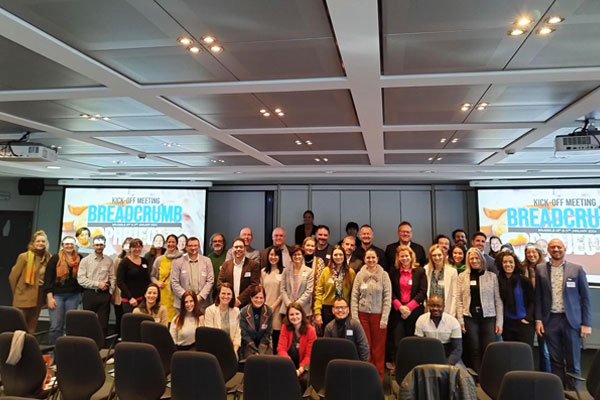January 18, 2024
BREADCRUMB project kick off meeting on 16-17 January 2024
Initiated on January 1, 2024, the BREADCRUMB initiative kicked off with a two-day assembly on January 16-17 in Brussels. Securing €5,003,746.41 in funding from the Horizon Europe Framework Programme, the project is overseen by Eigen Vergmogen Van Het Instituut Voor Landbouw – En Visserijonderzoek (EV-ILVO). The project consortium, led by EV-ILVO, consists of 21 participants hailing from 7 countries. Together, they will collaborate over the next 36 months to develop Evidence-based food Chain solutions aimed at preventing and reducing food waste associated with marketing standards, while simultaneously delivering climate and circularity co-benefits.
BREADCRUMB aims to simplify food marketing standards by:
-
- Creating an inventory of private and public standards, explaining their purpose.
- Establishing empirical evidence for estimating food waste (FW) in five commodities (fruit & vegetables, meat, eggs, cereals, fish).
- Modeling how marketing standards contribute to FW and suggesting a re-balancing of existing standards.
- Improving market access for suboptimal foods, guiding businesses in selecting channels, and changing consumer perceptions.
- Providing operational and policy guidance based on results to prevent/reduce FW linked to marketing standards.
“What is needed is a dual approach, that first prevents FW generation by ‘re-balancing’ food marketing standards, and then improves market access to suboptimal foods to prevent them from becoming FW. “
Marketing standards encompass regulations designed to guarantee that purchased food adheres to specific quality criteria. They contribute to enhancing the quality of agricultural products and aligning with consumer expectations. These standards employ precise terminology to delineate the attributes of various food items. The European Union is currently engaged in the revision of these standards to ensure they account for factors such as sustainability and evolving consumer preferences. Nevertheless, comprehending the comprehensive impact of these standards proves challenging, given their application to diverse food types and regulations at various levels.
The objectives of BREADCRUMB will be pursued by the European consortium through the implementation of a work plan, consisting of six Work Packages for three years. Partners participate in each WP, according to their specific expertise, know-how and research, innovation, and business interests.
The development of the BREADCRUMB website is underway, and it will soon offer information on the project’s goals, activities, advancements, and outcomes! Stay Connected!


